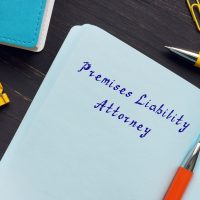Elements of a Premises Liability Case

Slip and fall injuries, swimming pool accidents, dog bites, elevator collapses, or any other accident that happens on someone else’s property may give rise to a premises liability claim. Premises liability is a type of personal injury claim that is appropriate when an accident victim was hurt on property owned or operated by another person, and that owner/operator’s negligence caused the victim’s injury. Below, we discuss the key elements of any successful premises liability claim. If you’ve been hurt in a slip and fall or other accident on someone else’s property, call an experienced Southern California premises liability lawyer for advice and assistance.
The Property Is Owned or Possessed by the Defendant
Like any personal injury case, one of the first questions to address for a premises liability claim is: Who is liable? For premises liability claims, to hold a party liable, the plaintiff must establish the party either owned the property or was in possession and control of the property. The owner of a building may be liable, or the party actually in possession and control, if different.
For example, in an apartment building, the landlord may be held liable for accidents that occur in the stairway and other common areas. In a particular apartment, the renters may be held liable, even though they only lease the property from the owner. In a commercial space such as a grocery store or restaurant, the store owner will likely be the appropriate party, regardless of whether they own the building.
Complications can arise when there is a dispute over who has control over a given area or element. For example, what happens when the roof collapses in a retail store? The shop owner had possession of the commercial space, but the landlord or building owner likely had greater control over the condition of the roof. An experienced premises liability attorney can help you identify the appropriate party to be held responsible for a given accident.
The Defendant Violated a Duty of Care to the Plaintiff
Property owners and operators owe a duty of care to guests. At a base level, parties must keep their property reasonably safe for ordinary use; they must use reasonable care to discover unsafe conditions or hazards; and they must fix, replace, or warn guests of hazards that could be reasonably expected to cause harm.
Owners may be held liable when they violate that duty by either creating a hazard on their property or allowing a known hazard to persist and then failing to either fix or adequately warn of that hazard. For example, if a store employee mops the floor, the store is now aware of a hazard (a wet floor). The store must either place adequate warning of the hazard–such as a clear and visible “wet floor” sign–or they must remedy the hazard by drying the floor.
The store owners may also be liable if they did not create the hazard but knew or should have known of the hazard. If a customer causes a spill, for example, the store should similarly clean or warn of the spill. The store has a reasonable time to respond–if the spill happened mere seconds earlier, it’s unreasonable to expect any store employee to react, but certainly they should know after some time has passed. They must take action to protect guests from any hazard they either knew about or should have learned about through reasonable inspection. Many cases turn on whether the owner should have reasonably known about a given hazard.
The Defendant’s Actions or Inaction Caused the Plaintiff Harm
An injured accident victim must show not only that there was duty and breach, but also that they suffered actual harm as a result of that breach. The plaintiff must show they suffered damages, such as a personal injury. They must also show that it was the defendant’s negligence that caused their harm.
In the grocery store example, if the plaintiff slipped on the wet floor and broke their wrist, they clearly suffered harm as a result of the store’s negligence. If the person tripped on their own, several aisles away from the spill, then the plaintiff has no claim against the store, even though there was a hazard present. If a person slips on the wet floor but suffers no actual injury, they will likewise have no claim.
Reach Out Today for Experienced Representation and Trusted Advice for Your Premises Liability Claim in Los Angeles or Orange County
If you or a loved one was seriously hurt in a slip and fall, ladder collapse, or another incident on someone else’s property in Los Angeles or Orange County, call Machtinger Law for advice and representation from a dedicated and successful Southern California premises liability attorney.
